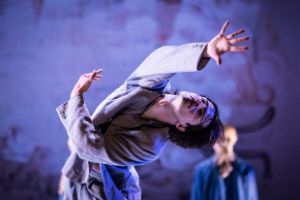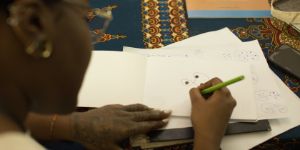

Irad Verkron © Franco Atsoc
Irad Verkron
Ventre de Leao a Historia de uma amizade, 2024
“Sona” refers to a form of communication using artistic means that is practised by the Tshokwé, a people in northeastern Angola. It is an old tradition somewhere between mathematical drawing and storytelling. Dots are first drawn in the sand in a regular grid. Lines are woven around these dots, which have a different meaning for the mathematical formula in question, depending on their length and line layout. Dots and lines in the sand thus lead to abstract but concrete images, which in turn convey meaning for an overarching story that is to be told. The “Lusona” (singular of Sona) is a representation of structures that, like constellations, mix mathematical knowledge, fortune- telling and everyday narration. However, here the dots are not connected to form images connecting people and their lives in horoscopes and myths. Rather, the dots are auratically entwined by shapes, becoming framed objects in a human drawing which, like the pattern of a woven fabric, turns into an abstraction of the real world.
For Ventre de Leão (a História de uma amizade), Portuguese for “The belly of the lion (the story of a friendship),” Irad Verkron uses this technique to tell her own story, together with that of a school friendship in Berlin that broke up when she moved to Angola. The traditional Sona drawing Ventre de Leão is displayed in a large-format spatial image on the roof of the Freispielhalle, the covered meeting room of Radical Playgrounds. From here, further Sona, which will be created during the first two weeks in collaboration with the visitors at Radical Playgrounds, wind their way along the slatted wall that surrounds the secret sand garden and the installation of The School of Mutants.
Irad Verkron was born in Germany and moved to Angola at the age of 9. In 2012, she founded the Verkron collective for urban art forms in the capital Luanda. Her large-format works in urban spaces are characterized by the combination of abstract forms and themes of the everyday, which are shaped by the resilience, strength and beauty of black Angolan women.